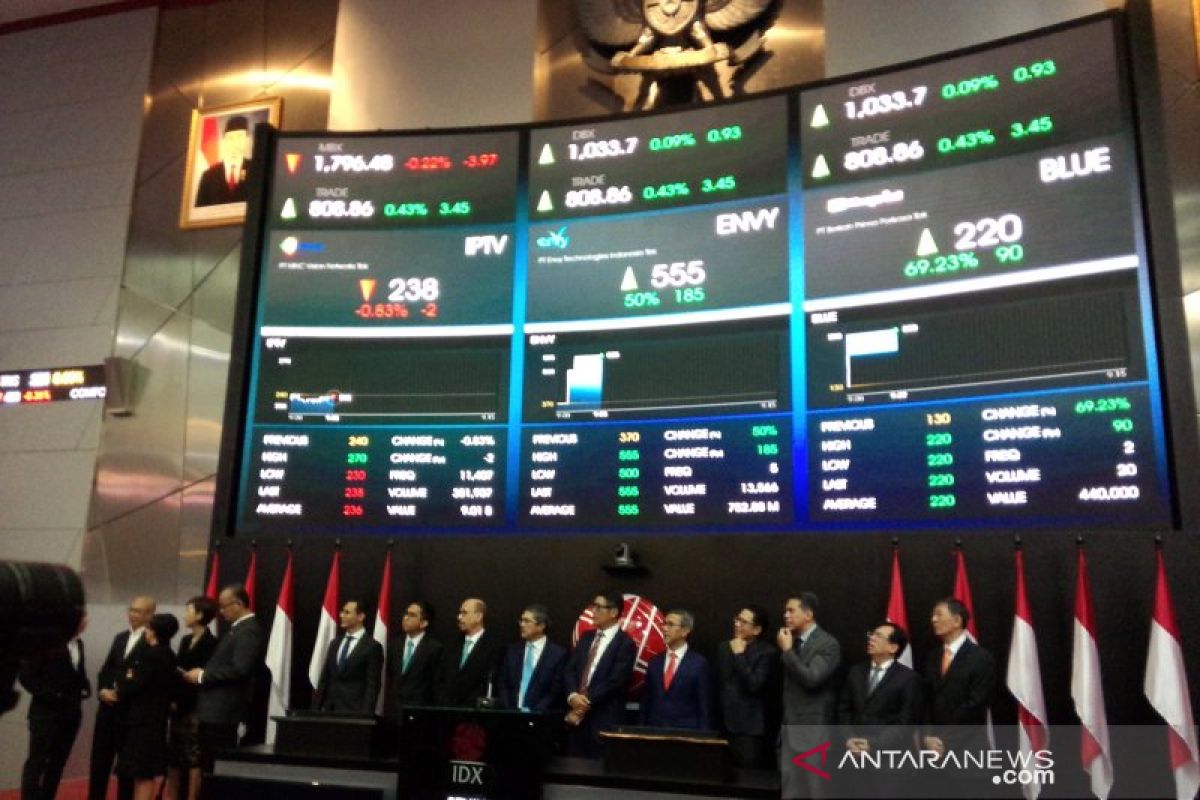Indonesia's equity and bond markets remain attractive despite slowdown in the global economy

Three companies officially launched on the Indonesia Stock Exchange (IDX), Jakarta, in early July, namely, PT Envy Technologies Indonesia Tbk, PT Berkah Prima Perkasa Tbk, and PT MNC Vision Networks Tbk, Jakarta, Monday (07/08/2019). (ANTARA / Citro Atmoko / aa)
Jakarta (ANTARA) - Indonesia's equity and bond markets remain attractive despite slowdown in the global economy during this time, Investment Specialist PT Manulife Asset Management Indonesia Dimas Ardhinugraha stated.
"The Indonesian stock and bond markets still offer quite lucrative investment potential despite the current global conditions marked by various dynamics," Ardhinugraha noted in an official statement received in Jakarta on Friday.
Ardhinugraha pointed out that in the midst of the current global economic slowdown, Indonesia is better shielded since its economic structure is not reliant on exports.
"It's position is different from that of our neighboring countries that rely heavily on exports for their economic growth," he pointed out.
The subsequent factor is Bank Indonesia likely reducing its benchmark interest rate. Hence, not only are global central banks planning to reduce interest rates this year, but he also gauges that this year, Bank Indonesia will likely start cutting down its interest rates.
Last year, Bank Indonesia had adopted an aggressive stance in raising interest rates up to six times to maintain the rupiah's stability and also to follow the US interest rate hike. This year, the rupiah has moved to a stable level.
"The US central bank also plans to reduce interest rates, so we see that Bank Indonesia will also likely move to reduce interest rates. This can have a positive impact on the stock and bond markets in Indonesia," Ardhinugraha stated.
Moreover, fiscal and monetary management in Indonesia is quite good, as was confirmed by the rating agency Standard & Poor's (S & P) that recently raised Indonesia's rating to BBB. This is indicative of investor confidence in the Indonesian economy as well as fiscal and monetary management.
This is a positive achievement, as amid the global economic slowdown, some other countries, in fact, received a "downgrade" rating. The ranking of countries, such as Brazil, Turkey, and Mexico, tends to fall, while on the contrary, Indonesia's rating rose.
"This is a very positive achievement. Hence, we remain positive regarding the outlook for the Indonesian economy in future," Ardhinugraha stated.
"The Indonesian stock and bond markets still offer quite lucrative investment potential despite the current global conditions marked by various dynamics," Ardhinugraha noted in an official statement received in Jakarta on Friday.
Ardhinugraha pointed out that in the midst of the current global economic slowdown, Indonesia is better shielded since its economic structure is not reliant on exports.
"It's position is different from that of our neighboring countries that rely heavily on exports for their economic growth," he pointed out.
The subsequent factor is Bank Indonesia likely reducing its benchmark interest rate. Hence, not only are global central banks planning to reduce interest rates this year, but he also gauges that this year, Bank Indonesia will likely start cutting down its interest rates.
Last year, Bank Indonesia had adopted an aggressive stance in raising interest rates up to six times to maintain the rupiah's stability and also to follow the US interest rate hike. This year, the rupiah has moved to a stable level.
"The US central bank also plans to reduce interest rates, so we see that Bank Indonesia will also likely move to reduce interest rates. This can have a positive impact on the stock and bond markets in Indonesia," Ardhinugraha stated.
Moreover, fiscal and monetary management in Indonesia is quite good, as was confirmed by the rating agency Standard & Poor's (S & P) that recently raised Indonesia's rating to BBB. This is indicative of investor confidence in the Indonesian economy as well as fiscal and monetary management.
This is a positive achievement, as amid the global economic slowdown, some other countries, in fact, received a "downgrade" rating. The ranking of countries, such as Brazil, Turkey, and Mexico, tends to fall, while on the contrary, Indonesia's rating rose.
"This is a very positive achievement. Hence, we remain positive regarding the outlook for the Indonesian economy in future," Ardhinugraha stated.









